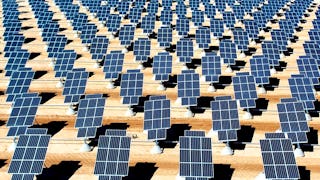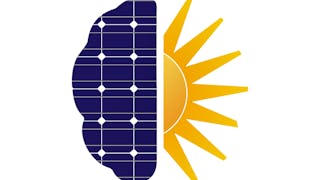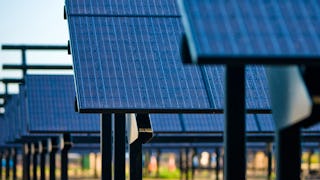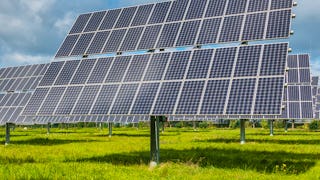The goal of the course is to give students awareness of the largest alternative form of energy and how organic / polymer solar cells can harvest this energy. The course provides an insight into the theory behind organic solar cells and describes the three main research areas within the field i.e. materials, stability and processing.



Organic Solar Cells - Theory and Practice

Instructor: Suraj Manikandan
73,853 already enrolled
Included with 
(1,232 reviews)
Skills you'll gain
Details to know

Add to your LinkedIn profile
14 assignments
See how employees at top companies are mastering in-demand skills

There are 6 modules in this course
By the end of the module we have set the following goals for you: -You should have gained knowledge on solar cells, and their place as a renewable energy -Be able to distinguish between different solar cell technologies -Describe the difference between the three generations of solar cells -Identify the four steps of life cycle analysis -Determine differences between embedded energy, energy return factor, and energy payback time.
What's included
7 videos9 readings3 assignments
By the end of this module you should: -Be able to identify the different steps in the theory behind the solar cells -Be able to measure the efficiency of a solar cell -Be able to describe the different layers in the solar cell and understand their function -Be ready to argue for different applications of the solar cells.
What's included
6 videos8 readings2 assignments
By the end of this module you should: -Know why we need conjugated polymers and side chains -Know about low band gap polymers -Be able to identify the most common polymerization methods -Be familiar with common characterization techniques used with the materials -Know about acceptor materials used in the active layer of organic solar cells.
What's included
6 videos10 readings3 assignments
By the end of this module you should: -Be able to identify different kinds of degradation behaviours -Know about decay curves, including concepts such as burn-in and T80 -Distinguish between different ISOS standards.
What's included
7 videos9 readings3 assignments
By the end of this module you will be able to: -Describe the lab scale techniques and the pros and cons -Describe the difference between coating and printing -Identify the different coating and printing techniques.
What's included
7 videos12 readings2 assignments
This is the final module of the course and it is almost time to sit back and congratulate yourself! You just have two more videos and an exam to complete.
What's included
3 videos1 reading1 assignment
Earn a career certificate
Add this credential to your LinkedIn profile, resume, or CV. Share it on social media and in your performance review.
Instructor

Offered by
Explore more from Chemistry


Technical University of Denmark (DTU)


Technical University of Denmark (DTU)
 Status: Free Trial
Status: Free Trial
University at Buffalo


The State University of New York
Why people choose Coursera for their career




Learner reviews
1,232 reviews
- 5 stars
73.94%
- 4 stars
21.10%
- 3 stars
3.16%
- 2 stars
0.97%
- 1 star
0.81%
Showing 3 of 1232
Reviewed on Jan 21, 2016
I learned new skills and theory about OPV. It's a very comprehensive and well structured course. I recommend it to every person who wants to improve their knowledge in solar panels technology.
Reviewed on Apr 20, 2017
I feel like the courses have been too close to the information you can get through their linked website. I think this is overall a very good introduction and was very helpful.
Reviewed on Oct 17, 2015
Great course, lots of material but really well presented. Touches all aspects of the organic solar cell production and the physical and chemical fundamentals behind it.

Open new doors with Coursera Plus
Unlimited access to 10,000+ world-class courses, hands-on projects, and job-ready certificate programs - all included in your subscription
Advance your career with an online degree
Earn a degree from world-class universities - 100% online
Join over 3,400 global companies that choose Coursera for Business
Upskill your employees to excel in the digital economy
Frequently asked questions
Organic Solar Cells - Theory and Practice is a specialized course on organic solar cells. If you are looking for a more general course we can strongly recommend Introduction to solar cells (https://www.coursera.org/learn/solar-cells). as an alternative
Access to lectures and assignments depends on your type of enrollment. If you take a course in audit mode, you will be able to see most course materials for free. To access graded assignments and to earn a Certificate, you will need to purchase the Certificate experience, during or after your audit. If you don't see the audit option:
The course may not offer an audit option. You can try a Free Trial instead, or apply for Financial Aid.
The course may offer 'Full Course, No Certificate' instead. This option lets you see all course materials, submit required assessments, and get a final grade. This also means that you will not be able to purchase a Certificate experience.
When you purchase a Certificate you get access to all course materials, including graded assignments. Upon completing the course, your electronic Certificate will be added to your Accomplishments page - from there, you can print your Certificate or add it to your LinkedIn profile. If you only want to read and view the course content, you can audit the course for free.
More questions
Financial aid available,

